
In 2016 Denis Villeneuve's film "Arrival" was released and was a huge commercial and critical success. The film is based on the 1998 "Story Of Your Life" short novel written by Ted Chiang.
We open with a narration from our main character, Louise Banks (played by Amy Adams):
"I used to think this was the beginning of your story.... Memory is a strange thing, it doesn't work the way I thought it did. We're so limited by time... by its order..."
From this unfolds an emotional and painful montage of Louise raising her daughter Hannah, who falls ill as a teenager and passes away. This prologue ends with a telling dialogue from Louise:
"But now I'm not sure I believe in beginnings and endings."
This is an important element that makes "Arrival" work. For the beginning of the story is as vital as its ending. In a way it's almost a clue, but what's brilliant about the film is how the reveal is made as the story progresses toward said ending.
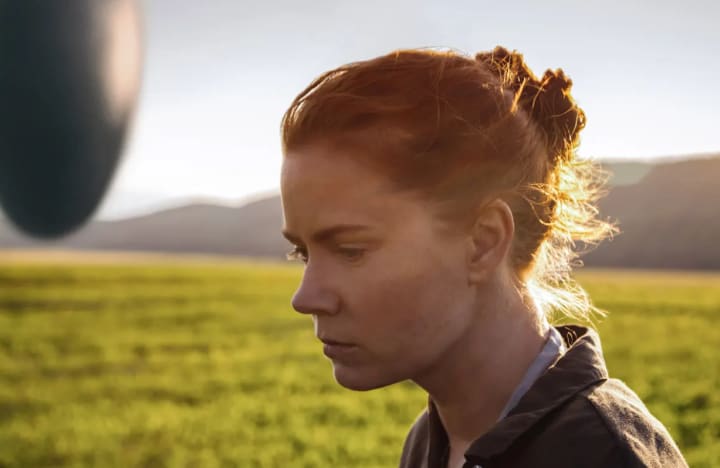
Louise is a linguist, a language specialist, who is called in by the government to help investigate a huge alien ship that has arrived on earth, one of 12 scattered around the world. She is joined by physicist Ian Donelly (played by Jeremy Renner), and the two undertake the arduous task of understanding the creatures manning the ships. They name the aliens heptapods and discover that their language is an incredibly complex system composed of circular symbols. The importance of language is another important element in "Arrival".
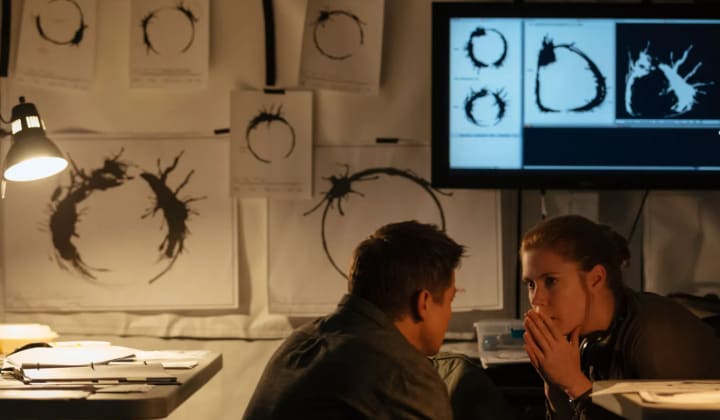
Whether it's about the dangers in information being lost in translation, or pointing out the mental change Louise begins to undergo. She begins to have memories of her daughter as she studies the alien language, but the more she learns of the circular symbols, the more deeply connected she feels to those memories. The government is nervous about the space visitors, particularly one word: "weapon," which frightens many people and causes a group of military renegades to plant a bomb inside the ship, damaging the relationship between the two sides and mortally wounding a heptagon.
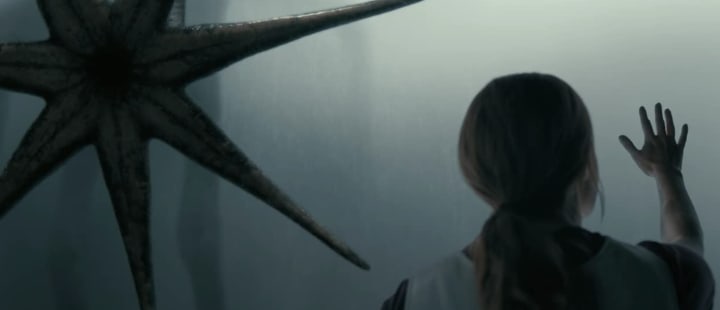
The world leaders agree to demand that the aliens leave Earth within 24 hours or they will be attacked. Louise goes to the ship one last time to talk to the surviving alien. The creature explains to Louise that they have come to earth to help humanity and that the weapon is indeed a gift. They plan to return in three thousand years to earth, when they know they will need the help of humans. They are aware of this because they are not limited to linear time. The gift is their language, which opens the door of time, according to them. Here we see the truth of Louise's daughter, Hannah.
Throughout the film we see flashbacks of her daughter's life, but Louise asks the heptapod, "Who is the little girl?" At the beginning, we see a memory of her daughter showing her a drawing she did in school. She says, "Mom and Dad talking to animals," describing the mission Louise went on with the heptapods. At this point, it becomes clear that Louise's visions are not memories of the past, but images of the future and that Hannah will be born after the arrival of the aliens. But to speak of Louise's memories as of the future goes against the real idea of the story, which is that the language of the heptapods does not allow one to see the future or the past, but to see and exist at all moments in time in a fluid, non-linear fashion. The more Louise learned of the alien language, or "weapon", or whatever you want to call it, the more she sees Hannah and begins to experience changes in her perception of time.
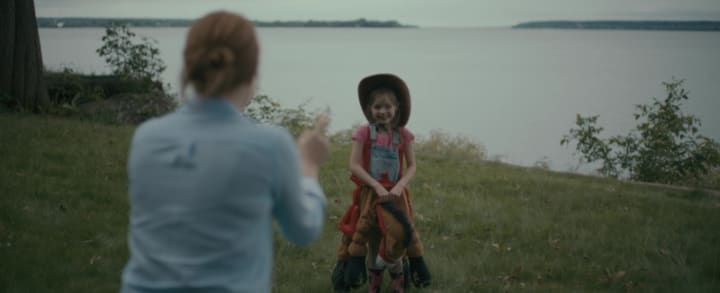
There is a theory known as the Sapir-Whorf hypothesis, or linguistic relativity, which proposes that our perception of time is tied completely, or at least partially, to our language. Louise begins to understand that the girl she sees in her dreams is her daughter, a daughter who has not yet been born and whose death is inevitable. We also realize why she named her Hannah. She names her with a palindrome, reading the same backwards and forwards, which describes her perception of time at that moment.
At the beginning, when she says that she "doesn't believe in beginnings or endings," everything is based on the idea of a palindrome. In the original short novel, the emphasis is on Louise's discovery and experience of this new language and perception of time, and also on her decision to have Hannah despite knowing the fate that holds her. The idea of free will and whether or not we have control over our destinies are the central ideas of the story. In "The Story Of Your Life," the plot remains intimate, personal and heartbreaking. But in "Arrival" we have the added element of China preparing to attack the ship, which adds to the tension when Louise accesses another point in the future and meets General Shang, the man responsible for deciding to attack the heptapods. He thanks her for convincing him to call off the attack when she called his private number and recited the secret words of his dying wife. What is suggested when Shang shows her his private number is that Louise becomes determined to teach the world what she calls universal language and that Shang, at some point, also began to perceive time differently and knew that she must know his private number and know his wife's last words. The past informs the future, the future saves the past and all points in time flow into the present. According to the screenwriter of "Arrival," Shang's wife's last words were, "In war there are no winners, only widows."
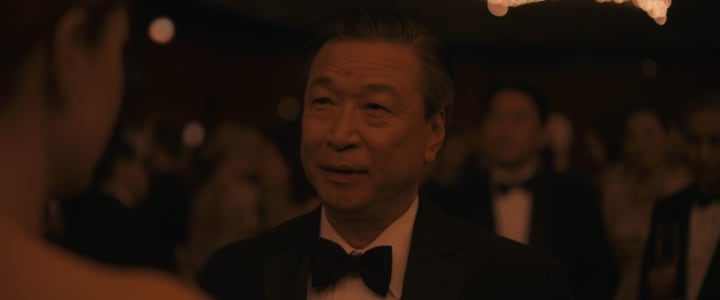
The heptapod ships leave Earth, having left the humans what Louise calls "the tool". We learn that Ian is Hannah's father and the reason he abandons Louise will be because she won't tell him about his daughter's inevitable death. The power of Louise's story is that she doesn't want to change the future, she doesn't decide to free herself from the pain of Hannah's death as not having Hannah would have also deprived her of the beauty of her daughter's life. It is an incredibly difficult decision to make if one were in the same position. Originally, in early versions of the script, the gift bestowed by the heptapods were the plans to build an ark-like interstellar ship, but when Christopher Nolan's movie "Interstellar" was released, they decided to change the idea for obvious reasons and instead focused on the concept of language, which is very interesting and personal. In the end, it's about one woman's decision rather than the idea of language and that her decision is not right or wrong, it's just her decision. She embraces it with the good and the bad that it involves, although it can be argued that if she saw Hannah when she began to perceive time non-linearly, then the child had always been destined to be born and that Louise had no choice, her decision may have already been made instinctively. This is the real paradox of the film because it grows towards an emotional climax in which a woman decides to have her baby knowing that she will die young, but at the same time everything had to happen if Louise had already experienced the memories of the future. But I like to interpret this dilemma in a simple way: Louise was always going to be the kind of person who could make that difficult decision and that in the end there was only one option left: love.

****
© Emby Lat
Thank you for reading this. If you liked my writing, please subscribe and click the little heart below this piece or near my name, at the top of this page.
If you liked this, you might also like this:
About the Creator
Emby Lat
I like movies, technology, games, art and anything that I find interesting.


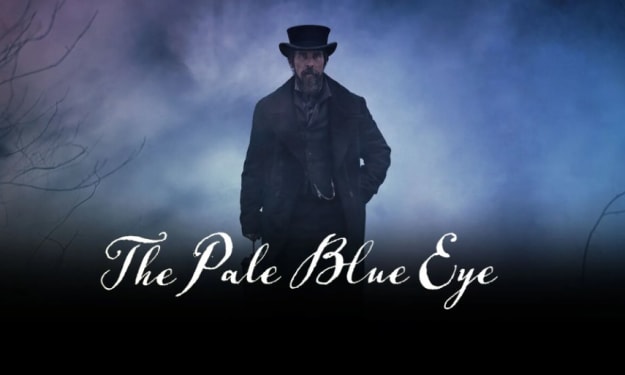



Comments
There are no comments for this story
Be the first to respond and start the conversation.